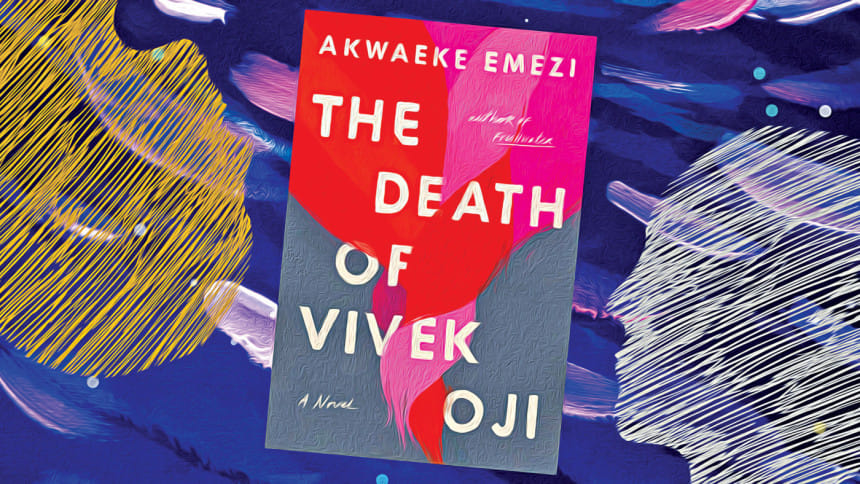In death, he became visible

Vivek Oji, the titular character in Akwaeke Emezi's second novel, is dead; this is stated in the title, the first line, and throughout the book. However, in every chapter, Vivek keeps coming alive, images of him rising out of the text's surface only to dissolve again.
The Death of Vivek Oji (Riverhead Books, 2020) is set in Nigeria, and follows the story of Vivek, his cousin Osita, his parents Chika and Kavita, his uncle and aunt, and the children of a community of "Nigerwives" who become his friends in what is to be the last days of his life. Vivek is an only child and has always been enough for his mother, Kavita, who will later find her son's corpse at her doorstop, devoid of any clothing and missing even the silver necklace he wore throughout his life.
As the story progresses, the number of people touched by his presence increases; each character altered by grief in their own ways, each holding onto little secrets as if guarding the man even after death. While his father Chika succumbs to a deep melancholy, his mother Kavita begins a frenetic search for what happened to her son, a search that comes with the cost of distancing those she has spent decades caring about. Her possessiveness for her son morphs into a possessiveness over who are allowed to mourn him. Rage and frustration pour out of her as Vivek's close circle—the ones who gave him the space to be himself and the ones who Kavita comes to realise knew her son better than she ever could—keep their lips sealed. Kavita comes to the awakening, unravelling and rude, that she never truly saw her son when he was still with her.
The first time we learn Vivek isn't a cisgender man, it isn't a dramatic coming out nor is it a scene of anxiety and anguish—he simply is, standing resplendent in his mother's jewellery and comfortable with himself. The suppression of his true self weighs on him, his ribs poking out of his chest as he refuses to eat the necessary amount of food. He emerges comfortable, however, saying to himself with calm assurance, "I would stop being a man. I was never one to begin with, anyway". "[H]e said we could refer to him as either he or she, that he was both," Vivek's friend Juju tells Kavita at one point.
The novel is firmly rooted in Nigeria, and as the reader delves further into the story, words, foods, and places like akamu (a cereal pudding), Owerri (capital of the Imo state in Nigeria), and "tukiakwa!" ("God forbid!") sound as natural as any other words we know. However, while it is common for well-written stories set in a specific place to often have characters and feelings that are universal, Bangladeshi readers in particular might find a significant part of this novel intimately familiar, from the father's gruff irritation at Vivek's long hair, to the fussy mothers perpetually concerned for their children, the fear for and actual loss of people's lives in riots they neither caused nor participated in, societal judgment upon the most innocuous deviations from the sociocultural norm, and the often unintentional lack of sympathy from parents and elders bewildered by aspects of their children's personalities. As a result, the children in this novel—as they do in life in Bangladesh—protect their parents by suppressing themselves, even as they waste like Vivek did.
A noticeable characteristic of the novel is its emphasis on the body, how emotions and histories come alive through it—the scar on Ahunna's (and later Vivek's) foot in the shape of a limp starfish, Osita's chipped tooth that acts as a mark of his childhood with Vivek. Feelings "s[i]ng", "bubble", and "boil" in this novel, love is "tactile and rich", and death and grief "cut [one] down like a tree". At one point, Kavita rests her hand on a young Vivek's "skull", a funny choice of words, until we find her looking at her adult son's corpse with a fractured skull later in the same paragraph. This emphasis on the physical in Emezi's writing adds a potency to the prose that allows readers to feel in their own bodies the characters' fragmented experiences.
Emezi's lucid and visceral writing enables the reader to clasp two concepts simultaneously: that Vivek once was and Vivek no longer is. At its heart, The Death of Vivek Oji is a book about relationships, particularly when it is impacted by the traumatic passing away of a loved one, and the unanswered questions it leaves behind.
In the end, what kills Vivek Nnemdi Oji are the place, its politics and its people, even those who love him.
Aliza Rahman is a contributor.

 For all latest news, follow The Daily Star's Google News channel.
For all latest news, follow The Daily Star's Google News channel. 



Comments